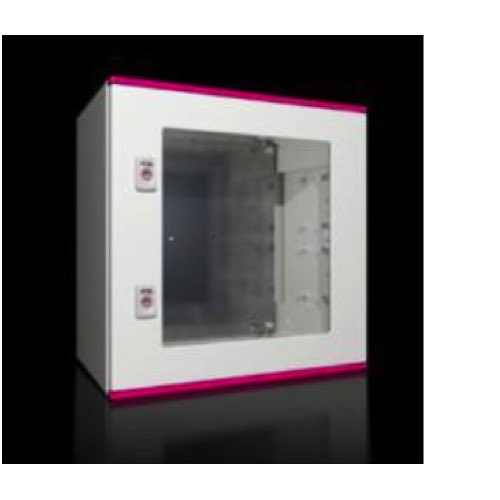Rittal Polyester Enclosures

Rittal polyester enclosures are designed to provide reliable protection for electrical and electronic components in industrial and outdoor environments. This category includes wall-mount enclosures manufactured from high-performance polyester materials that offer a balance of durability, corrosion resistance, and lightweight handling. Their non-conductive construction enhances electrical safety, making them well-suited for applications involving sensitive electrical or electronic equipment.
These wall-mounted industrial enclosures feature seamless, no-bolt construction with integral hinges and a captive gasket system. The hinged cover allows direct access to internal components while maintaining a secure seal to protect against dust, moisture, and environmental contaminants. This design supports efficient installation, inspection, and servicing without compromising enclosure integrity.
Rittal polyester enclosures are available in a wide range of sizes and can be customized with mounting accessories to meet specific application requirements.
FAQs
Q: What are Rittal polyester enclosures used for?
Rittal polyester enclosures are used to house and protect electrical and electronic components in industrial and outdoor environments where corrosion resistance and non-conductive materials are required.
Q: Are polyester enclosures non-conductive?
Yes, polyester is a non-conductive material that provides electrical insulation and enhances safety in applications involving energized components.
Q: What protection ratings do Rittal polyester enclosures offer?
Many Rittal polyester enclosures meet NEMA 4X requirements, providing protection against dust, water, rain, and corrosive agents.
Q: How are Rittal wall-mount polyester enclosures accessed?
These enclosures feature hinged covers with captive gaskets, allowing easy access for installation and maintenance while maintaining a secure environmental seal.
Q: How do polyester enclosures compare to other non-metallic enclosure materials?
Polyester enclosures offer strong impact resistance, chemical resistance, and lightweight handling. Compared to polycarbonate or fiberglass, they provide a balance of durability and cost-effectiveness for many industrial applications.
Why Buy Rittal Polyester Enclosures from RSP Supply
RSP Supply offers a full selection of Rittal wall-mount polyester enclosures designed for dependable performance in demanding environments. Our enclosure solutions support industrial, outdoor, and corrosive applications with non-metallic designs that emphasize protection, accessibility, and installation efficiency. Customers rely on RSP Supply for technical expertise, consistent availability, and enclosure products that meet rigorous operational requirements.

